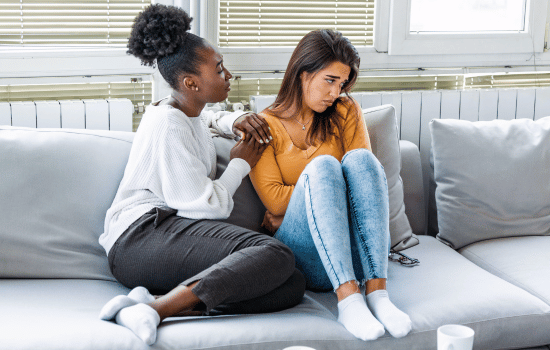How to Be More Confident in a Relationship: 7 Tips From a Therapist
Takeaway: While we might think of self esteem as something totally personal, it can impact every part of a person’s life—including their relationships. In this post, I’ll break down some common ways it can make it hard to connect with others and give you my expert tips on how to improve self confidence in relationships.
When you don't feel good about yourself, it can change the way you view other people and even the world around you. You might have a hard time trusting others or generally feeling safe in your day-to-day life.
As a self esteem therapist in Chicago, I see this all the time with my clients. So many of their struggles in relationships stem from a sense of insecurity and self doubt. Thankfully, I've also seen how it's possible to build confidence and ultimately feel good about yourself and your connections with others.
Here, I'll shed some light on the role of self worth in relationships and offer a few of my favorite strategies for helping my clients feel confident with their partner(s).
Let's dive in.
Why is confidence important in relationships?
The saying "you can't love others until you love yourself" may be a bit cliché, but it has some truth to it. If you're not building from a stable foundation (i.e. a strong relationship with yourself), it's difficult to cultivate trusting, healthy connections with others.
While all relationships have challenges from time to time, you might be more likely to struggle with these relationship issues if you have low self worth.
Communication issues. Low confidence might make it difficult to tell your romantic partner(s) what you need and how you feel, which can lead to all sorts of unintended negative consequences.
Codependence. While I’m not a fan of this term, I understand that it resonates with some people. Those who identify as “codependent” (remember–it’s not an actual diagnosis) often struggle to trust their own judgment and maintain boundaries. This can lead you to hyperfocus on your partner's needs (often sacrificing your own) and many other challenges that can make it hard to have a functional relationship.
Self-sabotage. If you don't think you're worthy of love and affection, you may consciously or subconsciously engage in behaviors that push your partner away. To get a clearer picture of whether you're doing this, take my "Am I Sabotaging My Relationship?" quiz.
Keep in mind that these are just a few examples of how low self esteem can take a toll on your relationship.
Also, this isn't to say that you're doomed to face these challenges if you struggle with self worth issues. With my tips and some intentional practice, you can gain confidence in yourself and take the steps needed to build healthy, fulfilling relationships.
7 ways to build self confidence in relationships
While growing your self worth takes time and effort, these strategies can help you start your journey toward feeling confident in relationships.
1. Check your self talk.
People with low self confidence tend to have negative self talk. If you're not familiar with the concept, it refers to the way we think about ourselves or the language we use to internally speak to ourselves.
To start, just notice your self talk. Are you overly critical of yourself? Do you make automatic assumptions about what other people must think of you?
Once you start to notice these thoughts, you can go a step further and begin interrogating them. You could consider where these thoughts come from, how true they likely are, and whether they're serving you at any given moment. For some people, doing this process through writing may be helpful.
2. Validate the valid.
When our inner critic gets triggered in a relationship, it can be easy to blame our partner. Those of us who struggle with confidence may have thoughts like "They don't actually love me," or "They're trying to hurt me on purpose."
However, these assumptions may actually be rooted in our own lack of self worth.
When you notice these thoughts come up, try to validate the feeling behind them rather than the thought itself. For example, it may not be true that your partner doesn't actually love you, but your feelings of hurt, rejection, or insecurity are still real and deserve to be acknowledged.
3. Identify and express your needs.
Low self worth can make it feel difficult to ask for what you want and need. You might feel like you don't deserve a wonderful relationship with a kind, caring partner, so you avoid doing or saying anything that might make you seem like "too much."
Yet, this approach can backfire. You may end up feeling unfulfilled or resentful toward your partner, and you might inadvertently be contributing to a dynamic that allows your partner to get what their way while you get walked all over.
Identifying your needs and boundaries—and then actually expressing them—is a key part of building more confidence in your relationship. You'll increase the likelihood that your partner cares for you in the way that you want, and you'll show yourself that you can advocate for yourself.
4. Focus on identifying and honoring your boundaries.
If you struggle with low confidence in your current relationship, you may put your partner's needs before your own. This could take the form of only doing activities they like, only spending time with their friends, and more.
While it makes sense to focus on what your partner likes some of the time, all relationships need balance and compromise. It's important for you to practice putting yourself first to show yourself that you're worthy.
This will involve expressing your needs which we just talked about above. It should also involve taking intentional time for self care. Carving out this time for you to focus on your own well-being can, again, show yourself that you deserve love, which can support the process of building confidence in your relationship.
5. Reflect on the root of jealousy.
When you don't feel confident in your relationship, you might struggle with feelings of jealousy.
Sometimes, your partner may actually overstep your boundaries or break your trust. Other times, however, you may feel jealous without any real "evidence" to back it up.
This goes back to the concept of validating the valid. How can you honor your feelings of insecurity without blaming your partner? This is also a great opportunity to practice expressing what you want and need from your partner to feel secure in the relationship.
6. Challenge yourself to be vulnerable.
It can be tough for anyone to share their true feelings, but it may be especially hard if you already struggle with self confidence. The idea of letting someone in and facing the possibility of rejection can be terrifying.
At the same time, this is the only way to foster true connection.
If your partner knows what's going on for you emotionally, they will be better equipped to give you the support you need. For example, if you're feeling jealous even though your partner has tried reassuring you, you could say something like, "I want to believe you, but I'm feeling insecure and having a hard time trusting right now."
7. Consider working with a therapist.
Building confidence can be hard work, especially if you've struggled with low self esteem for a long time. Breaking these patterns can be difficult, but you don't need to do it alone. Therapy can help.
In therapy, you'll get to the root of your self confidence issues and identify all the ways in which they're affecting your life—including your relationships. From here, your therapist will help you discover what changes you can make to feel better about yourself and build fulfilling connections with others.
Therapy gives you a safe, supportive space to practice expressing yourself, being vulnerable, and putting yourself first. Plus, working with a therapist can help you gain insight that may be difficult to achieve alone.
Start learning how to be more confident in relationships today.
At Hold the Vision Therapy, we specialize in helping people improve their relationships. This can take the form of one-on-one therapy where we dive into the patterns that contribute to your low self esteem. Others might benefit from couples therapy or polyamory therapy if they'd like to work on building confidence with their partner(s) in session.
Not sure which option is the best fit for you? If you live in Illinois or Indiana and are interested in working together, I invite you to reach out for your free consultation. Together, we'll figure out how we can best support you in fostering confidence in your relationships.








